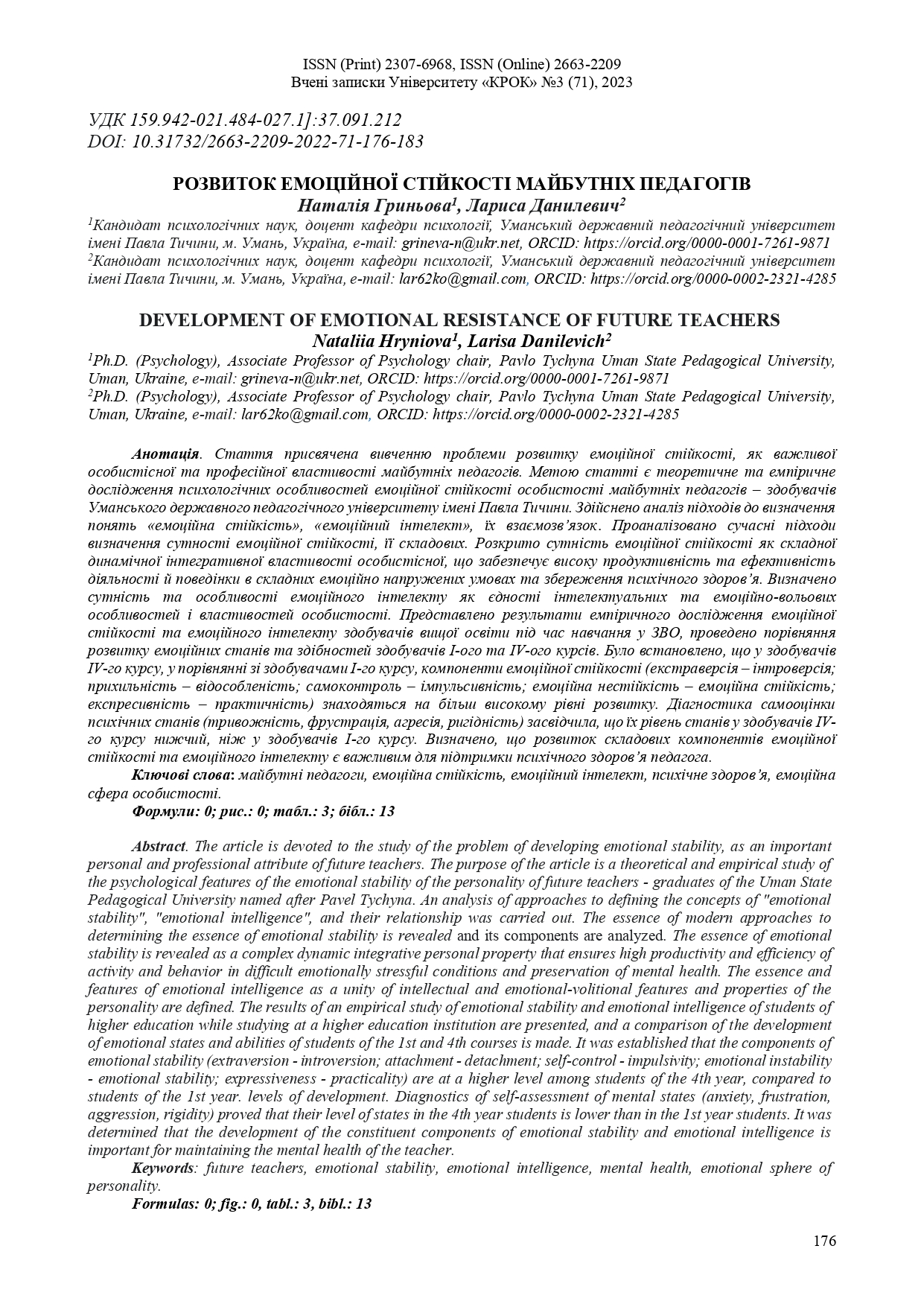РОЗВИТОК ЕМОЦІЙНОЇ СТІЙКОСТІ МАЙБУТНІХ ПЕДАГОГІВ
DOI:
https://doi.org/10.31732/2663-2209-2022-71-176-183Ключові слова:
майбутні педагоги, емоційна стійкість, емоційний інтелект, психічне здоров’я, емоційна сфера особистостіАнотація
Стаття присвячена вивченню проблеми розвитку емоційної стійкості, як важливої особистісної та професійної властивості майбутніх педагогів. Метою статті є теоретичне та емпіричне дослідження психологічних особливостей емоційної стійкості особистості майбутніх педагогів – здобувачів Уманського державного педагогічного університету імені Павла Тичини. Здійснено аналіз підходів до визначення понять «емоційна стійкість», «емоційний інтелект», їх взаємозв’язок. Проаналізовано сучасні підходи визначення сутності емоційної стійкості, її складових. Розкрито сутність емоційної стійкості як складної динамічної інтегративної властивості особистісної, що забезпечує високу продуктивність та ефективність діяльності й поведінки в складних емоційно напружених умовах та збереження психічного здоров’я. Визначено сутність та особливості емоційного інтелекту як єдності інтелектуальних та емоційно-вольових особливостей і властивостей особистості. Представлено результати емпіричного дослідження емоційної стійкості та емоційного інтелекту здобувачів вищої освіти під час навчання у ЗВО, проведено порівняння розвитку емоційних станів та здібностей здобувачів І-ого та ІV-ого курсів. Було встановлено, що у здобувачів ІV-го курсу, у порівнянні зі здобувачами І-го курсу, компоненти емоційної стійкості (екстраверсія – інтроверсія; прихильність – відособленість; самоконтроль – імпульсивність; емоційна нестійкість – емоційна стійкість; експресивність – практичність) знаходяться на більш високому рівні розвитку. Діагностика самооцінки психічних станів (тривожність, фрустрація, агресія, ригідність) засвідчила, що їх рівень станів у здобувачів ІV-го курсу нижчий, ніж у здобувачів І-го курсу. Визначено, що розвиток складових компонентів емоційної стійкості та емоційного інтелекту є важливим для підтримки психічного здоров’я педагога.
Завантаження
Посилання
Аршава, І.Ф. (2010). Прогнозування емоційної стійкості людини з урахуванням рівнів розвитку емоційного інтелекту. Медична психологія. Психіатрія. 1, 22–27.
Емоційний інтелект особистості (на хвилі Нової української школи): навч.-метод. посіб. /М. Яцюк (2019). Вінниця : Вид-во «Діло» URL: http://metodclaster.vn.ua/page/na_dop_met/5_2019/kaf_psiholog/Lab_psyhol/psyhologu.pdf.
Кордунова, Н. О., Дмитріюк, Н. С. (2020). Емоційна стійкість як важлива складова особистості у період фахової підготовки. Актуальні проблеми психології: зб. наукових праць Інституту психології імені Г. С. Костюка НАПН України. Том. VІ. Психологія обдарованості. Київ-Житомир: Вид-во ЖДУ ім. І. Франка, 6, 129–138. URL: http://appsychology.org.ua/data/jrn/v6/i17/17.pdf.
Лапшинська, Г. М. (2014). Огляд основних груп чинників емоційної стійкості особистості Вісник Харківського Національного університету імені В.Н. Каразіна. Сер. Психологія Зб. наукових праць. № 1121. 56, 23–27. URL: http://visnyk-ps.univer.kharkov.ua/vystnik_psy_ukr/nomera/1121.pdf
Носенко, Е. Л., Коврига, Н.В. (2003). Емоційний інтелект: концептуалізація феномену, основні функції : монографія. Київ. URL: http://distance.dnu.dp.ua/ukr/nmmateriali/documents/Em_intellekt.pdf.
Носенко, Е. Л. (2012). Емоційний інтелект як форма прояву важливої складової особистісного потенціалу – рефлексивної свідомості. Вісник Дніпропетровського університету. Сер. Педагогіка і психологія. 18, Т. 20, № 9/1, 116–123.
Овсяннікова, Я. О. (2009). Теоретико-методологічні підходи до аналізу понять емоційної, психологічної стійкості та стресостійкості. Проблеми екстремальної та кризової психології. 6, 85–94. URL: https://nuczu.edu.ua/sciencearchive/ProblemsOfExtremeAndCrisisPsychology/vol6/011.pdf.
Пилипенко, К.В. (2019). Емоційна стійкість як професійно важлива якість майбутнього педагога. Актуальні проблеми психології в закладах освіти. Збірник наукових праць. 9, 154–159. URL: https://journal.kdpu.edu.ua/psychology/article/view/3723
Пилипенко, К. В. (2010). Формування емоційної стійкості як професійно важливої якості майбутнього практичного психолога: автореф. дис. … канд. психол. наук 19.00.07. Київ.
Пухно, С. В., Щербак, Т. І. (2022). Емоційна стійкість як складова емоційно-етичної компетентності майбутніх вчителів. Актуальні питання природничо-математичної освіти. Збірник наук. праць. 2 (20), 136–143. URL: https://library.sspu.edu.ua/wp-content/uploads/2023/02/aktualni-pytannya-pryr.-mat.osvity_220_2022.pdf.
Сингаївська І. В. (2015). Психологічні особливості узгодження особистісних і суспільних вимог до професійної успішності викладача. Проблеми сучасної психології. 30. 574–588.
Яновська, Т.А. (2018). Особливості формування емоційного інтелекту майбутніх педагогів під впливом інтерактивних методів навчання. Молодий вчений. Психологічні науки. 4 (56), 232–235. URL: http://molodyvcheny.in.ua/files/journal/2018/4/53.pdf.
Gramzow, R. (2004). Patterns of Self-regulation and Big Five. European Journal of Personality, 18, 367–385.

Downloads
Опубліковано
Як цитувати
Номер
Розділ
Ліцензія

Ця робота ліцензується відповідно до Creative Commons Attribution-NonCommercial 4.0 International License.

